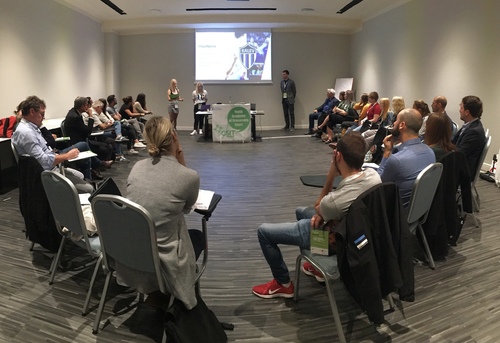Just in time before the opening of the 41st CSIT congress the European Commission confirmed the extension of the successful CSIT project Youth Academy “YOUAca”
Launched in March 2019 the purpose of “YOUAca” was to give young people from the CSIT member unions KALEV (Estonia), TUL (Finland), UCEC (Spain) and AICS (Italy) the opportunity to gain sports management skills of grassroot sports under the leadership of CSIT. The 41st CSIT Congress should mark the end of the EU project “YOUAca”. Just some days before the Congress in Rome the EU extended the project for another year till the end of 2020.
The last “YOUAca” meeting in Rome started with the closing presentations of the participating teams which will be officially presented at the 1st World Amateur Sport Forum on Friday morning at the CONI headquarters in Rome. To receive valuable feedback from experienced sports management experts the project leaders invited CSIT President Bruno Molea and some members of the CSIT ExCom to listen to the presentations and give last inputs to the Young Leaders work.
After the contribution of final thoughts from the CSIT leaders Valeria Gherardini from the president`s office happily announced that the application for “YOUAca 2.0” has been approved by the European Commission. The training program of “YOUAca 2.0” will be characterised by the “Learning by Doing” approach. The participating teams are the same, extended with a new group from the new CSIT member Health Life Academy (Croatia), the organizer of the 7th CSIT World Sports Games 2021 in Zagreb.
During two international meetings and one internship the Youth Academy will engage 50 youngsters and young adults as well as 27 experienced senior sports leaders from across Europe. In addition, in order to enhance the developed skills from the first edition of the project, peer trainers consisting of the best young leaders evaluated out of the first edition will complete the team “YOUAca 2.0”.
As conclusion of the first “YOUAca” version CSIT President shared his thoughts with us about the successful EU Project:

